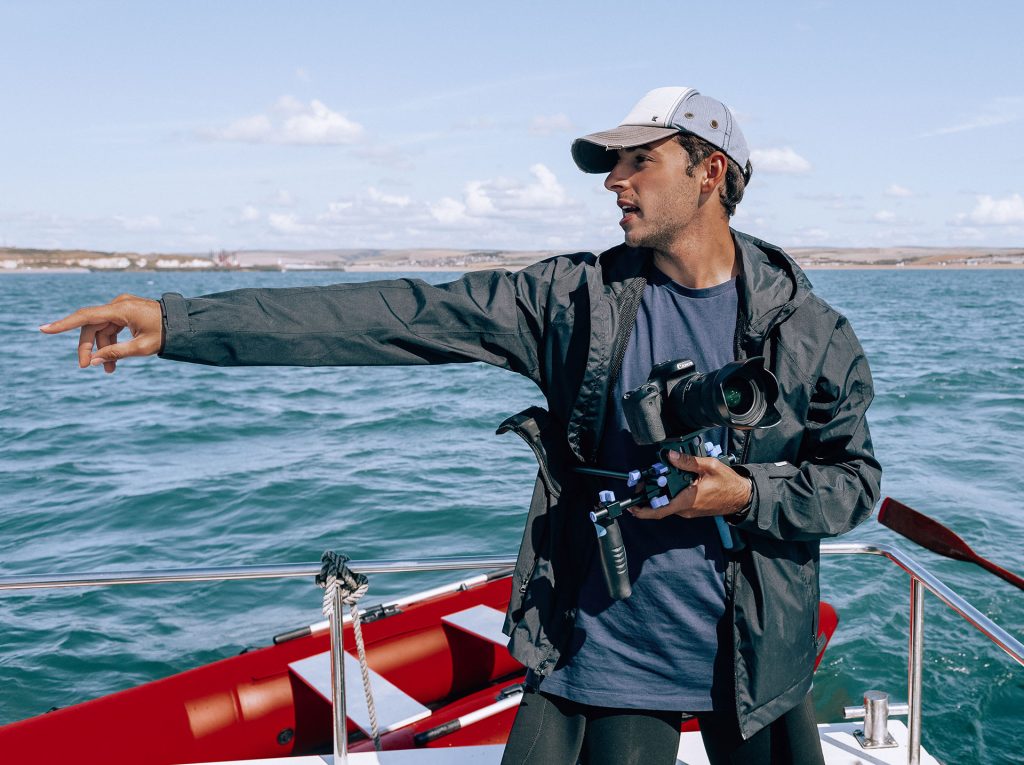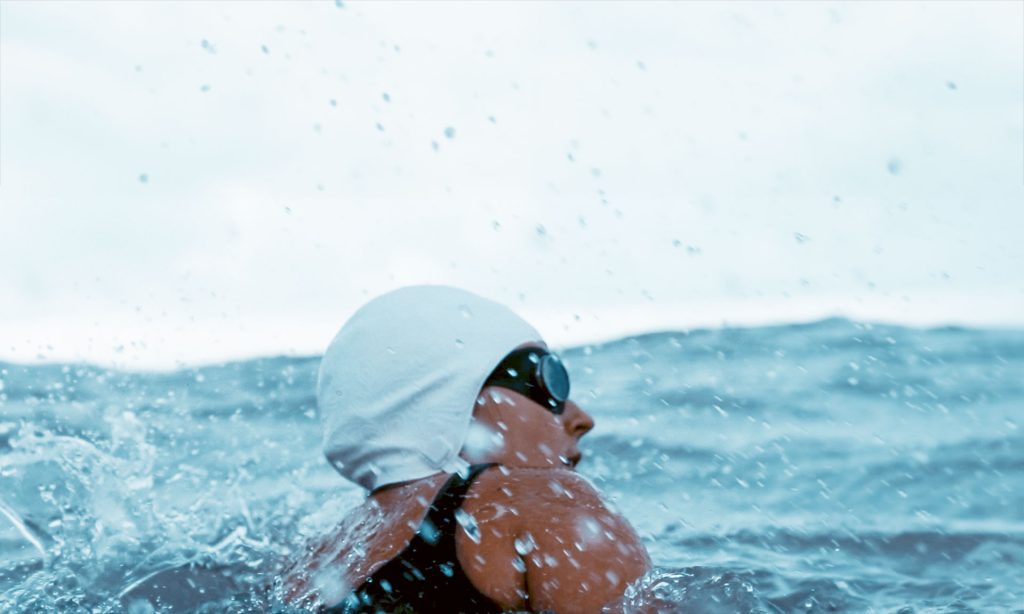Vindication Swim: The Director’s notes
A new film that hits cinemas this spring tells the story of Mercedes Gleitze, the first British woman to swim the English Channel. Living Magazines speaks to director Elliott Hasler about Vindication Swim
Every now and then, a story comes along that reminds us that life is for living.
Vindication Swim tells the inspirational true story of Mercedes Gleitze, who was the first known person to swim the Straits of Gibraltar and the first British woman to swim the English Channel in 1927.
The biographical drama was directed by award-winning Elliott Hasler, who spent three years creating the film with his production company. It gets its theatrical release on 8th March, to coincide with International Women’s Day.
“The movie started off as quite a small project so it’s nice seeing it evolve into this huge thing,” says Elliott.
Mercedes, like Elliott, was born in Brighton.
“For me, there was that immediate connection with someone local to myself and we were born almost exactly a century apart. That cemented my interest in Mercedes and her story. Her achievements captivated me so it was natural that I’d want to make a film about it.
“Most filmmakers wouldn’t even consider the idea of filming out on the open water but that made me want to do it even more. The challenge of filming all the scenes in the English Channel itself was another very big draw for me.”
Mercedes began swimming for pleasure in the River Thames. In 1923, she spent 10 hours 45 minutes swimming in the Thames, a then record for a woman. Then in 1927, she swam the English Channel on her eighth attempt, becoming the first British woman to do so.
In the following days however, another woman using her professional name of Mona McLennan, claimed to have swum the channel in a quicker time. As it transpired, Mona’s claim turned out to be a hoax, and this undermined Mercedes’ record.
As a result, and under pressure from the media, Mercedes agreed to undertake a ‘vindication swim’.
Like Mercedes, director Elliott didn’t do things the easy way.
“I’d never wanted to do anything simple or constrained and the appeal of filming out at sea really drew me to it. We started out as a very small production and people had never heard about Mercedes. But as we progressed, it was very much word of mouth and people started coming on board and it all snowballed. Now we’re looking at a theatrical release, which we could never have anticipated.

“Filming out at sea was one of the more challenging aspects of the project. It took three whole years to get the production done and out there into the world. We were limited to the summer months because it was too cold outside of that window. We really were at the whim of Mother Nature. Our work was dictated by the wind and the tide and the swell. Sometimes we’d get out there and we’d get two shots and have to come back; sometimes we wouldn’t get out there at all.
“It was a long process but an incredibly rewarding one. When you do get the shots and everything goes according to plan, it’s an amazing experience. You know how hard it is so the reward of getting it in the can is extra rewarding.”
Vindication Swim is Elliott’s professional debut feature.
“I began film making from around the age of 10 years old – small, short films with friends and family and the quality grew over time. I never went to film school or studied film formally. Everything I learnt was through trial and error on my own little projects. When I was 14, I made a film called World War II: The Long Way Home, which was about my great-grandfather’s experiences in the Second World War.
“It was an amateur project; I was at school at the time and it was friends and family who were acting in it but it got picked up for a UK and US release. It was in the Top 25 on Sky for a while and did very well in UK DVD sales too. It was quite shocking actually that an amateur production that I’d made while I was at school, to see it take that journey was incredible. Off the back of that success, Vindication Swim was able to happen. I’d always wanted to do another film after The Long Way Home and Vindication Swim seemed like the perfect fit.”
The movie also has some local connections to Cardiff.
“We played the movie at the Cardiff Film Festival in 2022 where it was a finalist for Best Feature Film,” says Elliott. “Then there’s the authentic footage of Mercedes swimming at Barry Island. I believe the footage was shot in 1929. It was unseen footage so anyone who hasn’t seen the film won’t have seen it.
“Someone in Sussex found it – their father had shot this film back in the 1920s and had been put in a box and put away and left for nearly 100 years. They heard about the film and got in touch and said ‘I’ve got this footage of Mercedes Gleitze at Barry Island and would you like to use it in the film?’. So we looked at it and it was a great piece of footage – for an amateur piece of footage back then; it was really good quality.”
The footage was the perfect addition to the film, showing Mercedes herself in her natural element.
“The difficult thing was getting it digitally restored and put into the film. It was on nitrate film which a lot of the restoration houses wouldn’t touch because it’s so highly flammable and it was a risk to their workspace. Old nitrate films are even worse because they deteriorate over time and become more unstable. We did find one specialist place in East London who would take it and they did a great job. So we have about two minutes worth of footage of Mercedes in Barry Island as it was in the 1920s.
“This all happened by the time we’d wrapped up filming so we added it at the end. It was the perfect fit for us – a closing montage. As for the film itself, I first heard about the story back in 2018 when I came across this article and was fascinated by it.”

Mercedes’ family weren’t involved in the making of the film but they were very kind and generous to Elliott and his production company.
“We even managed to get a blue plaque put on her house,” beams Elliott, “and one of her family did a nice job with the press around the movie. We hope the movie does Mercedes justice.”
The film is one of identity and Mercedes trying to find hers as a British-born woman with German parents shortly after WWI, which was a very difficult place to be.
“She was faced with the prejudices of her German heritage and also of being a woman in that era. Here’s a woman who wasn’t just working in a factory. She went out to defy all that and swim the English Channel and broke those societal barriers that were in place. The film is about her trying to figure out who she is in this changing landscape. There are also themes of determination in the film. She was never going to be told ‘no’, which is what I found so fascinating about her. She just went out there and did this with no regard to what people thought or said. She wanted to do it no matter what.
“There’s a strong element of determination and following your dreams and turning them into a reality. It’s an inspirational film. Its theatrical release has been chosen to coincide with International Women’s Day. It’ll have a digital release then in June.”
In a world where inspiration and hope are much needed, it’s perhaps Mercedes Gleitze and her incredible story who can provide that.
Find out more about the film at www.vindicationswimfilm.com


